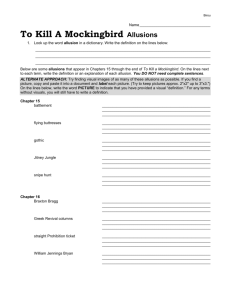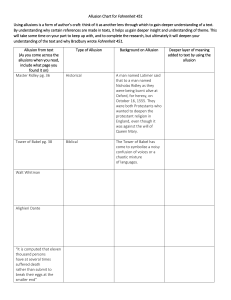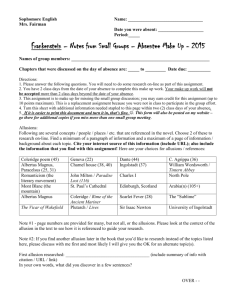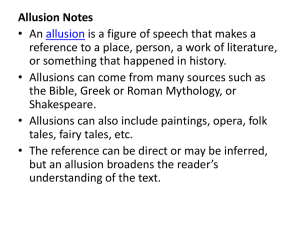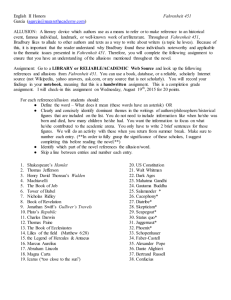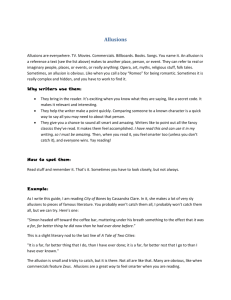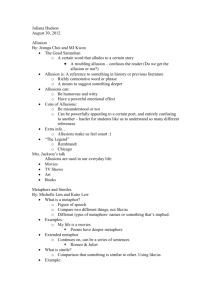Fahrenheit 451 Allusions ALLUSION: An allusion is a reference to a
advertisement
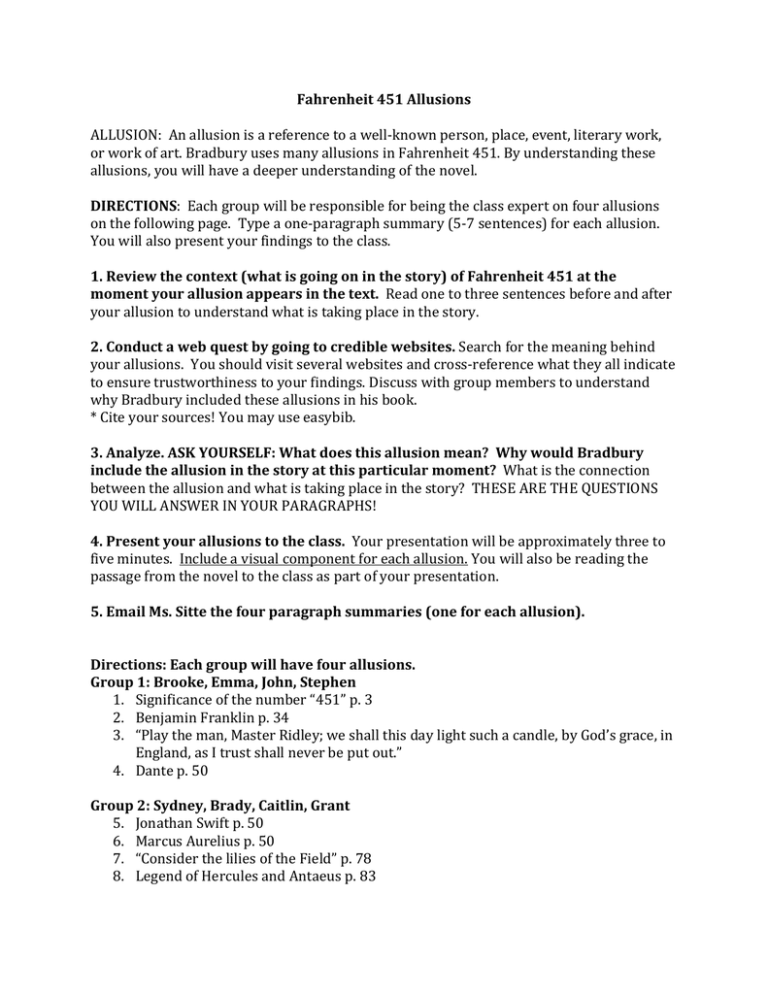
Fahrenheit 451 Allusions ALLUSION: An allusion is a reference to a well-known person, place, event, literary work, or work of art. Bradbury uses many allusions in Fahrenheit 451. By understanding these allusions, you will have a deeper understanding of the novel. DIRECTIONS: Each group will be responsible for being the class expert on four allusions on the following page. Type a one-paragraph summary (5-7 sentences) for each allusion. You will also present your findings to the class. 1. Review the context (what is going on in the story) of Fahrenheit 451 at the moment your allusion appears in the text. Read one to three sentences before and after your allusion to understand what is taking place in the story. 2. Conduct a web quest by going to credible websites. Search for the meaning behind your allusions. You should visit several websites and cross‐reference what they all indicate to ensure trustworthiness to your findings. Discuss with group members to understand why Bradbury included these allusions in his book. * Cite your sources! You may use easybib. 3. Analyze. ASK YOURSELF: What does this allusion mean? Why would Bradbury include the allusion in the story at this particular moment? What is the connection between the allusion and what is taking place in the story? THESE ARE THE QUESTIONS YOU WILL ANSWER IN YOUR PARAGRAPHS! 4. Present your allusions to the class. Your presentation will be approximately three to five minutes. Include a visual component for each allusion. You will also be reading the passage from the novel to the class as part of your presentation. 5. Email Ms. Sitte the four paragraph summaries (one for each allusion). Directions: Each group will have four allusions. Group 1: Brooke, Emma, John, Stephen 1. Significance of the number “451” p. 3 2. Benjamin Franklin p. 34 3. “Play the man, Master Ridley; we shall this day light such a candle, by God’s grace, in England, as I trust shall never be put out.” 4. Dante p. 50 Group 2: Sydney, Brady, Caitlin, Grant 5. Jonathan Swift p. 50 6. Marcus Aurelius p. 50 7. “Consider the lilies of the Field” p. 78 8. Legend of Hercules and Antaeus p. 83 Group 3: Stephanie Domnick, Max, Sam Jockish, Mariana Kortz 9. Milton p. 87 10. Sophocles p. 87 11. “…like a native fleeing an eruption of Vesuvius” p. 93 12. Cheshire Cat p.93 Group 4: Kate, Julia, Truman, Bailey 13. Dover Beach p. 99 14. “The sheep returns to the fold” p. 105 15. "For these were the hands that had acted on their own, no part of him, here was where the conscience first manifested itself to snatch books, dart off with Job and Ruth and Willie Shakespeare, and now in the firehouse, these hands seemed gloved in blood. p. 105 16. Quote by Sir Philip Sidney p. 106 Group 5: Alize, Anthony, Jordan, Landon 17. 2 Quotes by Alexander Pope p. 106 18. All’s well that ends well p. 108 19. “Burning Bright” (title of Part III)- hint: check out William Blake poetry 20. “Fly near the sun and now that he’s burnt his damned wings” (Icarus) p. 113 Group 6: Brigid, Collin, Robert, Natalie 21. Cassius (from Shakespeare) p. 119 22. Plato’s Replublic p. 151 23. Jonathan Swift’s Gulliver’s Travels p. 151 24. We’re the odd minority crying in the wilderness (p. 152) Group 7: Therese, Stephanie Jackson, Sam Kottoor, Riley 25. Ecclesiastes (from Bible) p. 160 26. Revelation (from Bible) p. 160 27. Tree of Life p. 165 28. Conan Doyle’s Baskerville Beast p. 173
